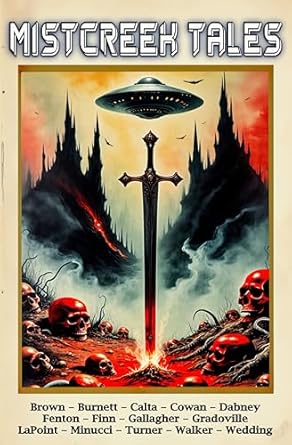Welcome back to the wasteland!
We're finally in 2026 and the new year. Hope I didn't keep you waiting too long!
As you can see, things are a little different around here these days. Posts will come out when they come out, and will be about whatever I can make them about. However, most of my writing energy is focused elsewhere this year so it'll probably be a light one for posts. Regardless, here I am, and here is the first post for 2026.
Today's subject is not entirely related to the video above, though it is included in the subject. I realize what a controversial topic the AI thing is and how there are so many triggerwords that set emotions off in different directions when heard or read, but I'm hoping we can bypass all of that to talk about it from a different angle. Instead of talking about "real" or "fake" I want to talk about the future and how we're going to process information.
The Second Story's video is specifically on how AI is coming about at a bad time for literacy and making it worse, which no one really denies, and she is very thorough in her argument. Whether you are all-in on or staunchly against AI, the truth of the matter is that there are positives and negatives to it neither side wants to acknowledge in order to keep their position pure and just. We can admit that. That is fine and all, but that means there are angles that can't be discussed without a portion of those involved in said argument flying off the handle in a fit or rage or smarmy sarcasm. This isn't exactly a productive use of anyone's time.
None of that will help with today's subject. I want to talk about a part of this whole debate that is never really addressed at all.
Now I know how divisive or tiring the topic might be, but I want to specifically point out one part in the video itself to focus on today. This is on how AI affects not art or even writers or artists, but on cultivating readers.
The clip is here:
For as long as I've been alive, and maybe for yourself as well, we've been very busy trying to automate the world to make it easier. The question might be to ask "easier for who?" but even that is not necessarily the subject for today's post.
The end goal of modern society for at least as long as HG Wells was talking about "The World Brain" and what "we should do with ourselves" has been a conscious effort from a gaggle of late 19th/early 20th century materialists to create Eden on Earth. All we had to do was train human beings with the right keywords and phrases and eventually they will become like algorithms themselves, endlessly operating until they fall apart with age to be replaced with new cogs in the machine. Heaven on Earth for those in charge.
However, without any theory of what human beings are beyond meat puppets on strings, they also hold no value of them as living beings because "living" is a vague term that can mean whatever you want. In essence, human beings are nothing but pawns on the board that get instantly replaced with new ones, because that is how those in charge think the world works. They don't actually have any theory in mind for groups or individuals, they don't care who anyone is or what they're apart of, all they want is new pieces to constantly replace old ones.
What's worse is that they don't even remember why they're playing this game in the first place. To them, it's just How It's Done, because that's how their father and grandfather and great-grandfather operated, oblivious in the knowledge that the period they live in is an anomaly in human history, not the advancement of it, and that it is very clearly coming to an end. Whether they realize that of not is irrelevant aside from the fact that they are clearly losing control.
This doesn't mean they will be "overthrown" or "destroyed" or any fancy buzzwords they taught us from the fiction and fictious accounts of history they allowed to be spread, but that they are decayed along with everything else. They might think they're winning, and in a material sense they probably are, but in the end they will also be a cheap mockery of what came before. They do know this. The question is if they can gather the strength to avert from the iceberg before it's too late and they end up like every other era in history they pretend never happened.
So what does all this have to do with literacy?
The point is that we were never taught to actually process information or learn. We were taught to react to key words and phrases to guide is into our slot to keep the factory chugging along, even as it falls apart around is due to misuse. "Literacy" has never actually existed to make us smarter or to build anything new, because that would go against the Spirt of the Age. Those were always just buzzwords to keep us in line and to puff our chests out. Remember the Kid Who Reads archetype from the '90s? The "reading is magic" and "imagination is everything" hokeyness? Those weren't done to make anyone more imaginative or to be better readers. If they were, and if everyone remembers that happened, because it did, why do less people read than ever before in human history?
And no, this isn't about the younger generations, because I can see the technological excuses coming a mile away. I'm talking about the older generations, the ones that were reading Harry Potter while playing Grand Theft Auto: Vice City or Goosebumps while playing The Legend of Zelda: Ocarina of Time decades ago. Why don't they read anymore? They indulged in Reading Rainbow like everyone else, and they read when they were younger. So why not now?
We might be "busier" but every generation was busy and yet they all found time to read. One could also point out OldPub's complete collapse and failure to create readers (In truth, their job is to pass on the "correct" knowledge and behaviors, not teach creativity or spread imagination), but that wouldn't also explain the aversion to indie spaces or classics. At some point, literacy changed focus to relying entirely on catch words and social pressure at the expense of even understanding regime propaganda. They don't even want us to think that much anymore.
Perhaps that should be the question we ask when the fading culture of today drops things on our laps: how will this help us escape the trap we've been stuck in for so long? Will this get us out of the failed utopia of HG Wells and his World Brain? If not, then how is it designed to keep us there and what can we do differently?
For now, we can only ask questions, but if we aren't allowed to ask them, or even teach others how to ask, then we'll be stuck in the loop, destined to decay with the system that created it. And maybe that's the lesson in all this.
Anyway, thanks for reading and welcome to 2026! I'm not sure when the next post will be, but I will thank you for reading for so long. It's been a blast.
Have yourself a good week and I'll see you again.

















